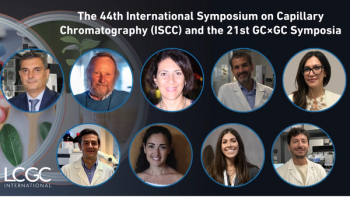
Mass Spectrometry and Biofuels, Ballroom A
The call for increased biofuel production will surely be closely followed by a need for improved methods of analysis. The six presentations in this Tuesday morning session will examine various roles of mass spectrometry in biofuels analysis and will cover topics such as biodiesel characterization, metaproteomic analysis of termite microbes relevant to biofuel development, and multiple reaction monitoring of biofuels systems metabolic pathways.
The call for increased biofuel production will surely be closely followed by a need for improved methods of analysis. The six presentations in this Tuesday morning session will examine various roles of mass spectrometry in biofuels analysis and will cover topics such as biodiesel characterization, metaproteomic analysis of termite microbes relevant to biofuel development, and multiple reaction monitoring of biofuels systems metabolic pathways.
The first presentation in the session will be delivered by Mary Lipton of Pacific Northwest National Laboratory (Richland, Washington) and is titled “Mass Spectrometry in the World of Bioenergy Research: An Overview.” Lipton’s talk will discuss how biological MS characterization of biofuels will be part of the drive toward a fossil fuel–independent future.
Lipton’s presentation will be followed by G. John Langley’s talk, “Biodiesel: Profiling, Stability and MS Solutions.” Langley, of the University of Southampton (Southampton, UK), will cover the age profiling and analysis of biodiesel as it relates to the quality and oxidation of biodiesel fuel stocks.
Kristin E. Burnum’s (Pacific Northwest National Laboratory) presentation, titled “Metaproteome Analysis of a Termite Hindgut Microbial Community: Relevant to Biofuel Development,” will focus on an early step in biofuel development. She will talk about the complete metaproteomic characterization of a laboratory-kept microbial community relevant to biofuel development.
Helge Egsgaard of the Biosystem Division of Risoe-DTU (Roskilde, Denmark) will discuss novel results for the residual bio-char organics in her presentation “Bio-Char Investigated by Analytical Flash Pyrolysis and GC–MS.” She will discuss the characterization of bio-char based on analytical flash pyrolysis combined with GC-MS.
The next presentation will be given by Richard J. Giannone of the Oak Ridge National Laboratory (Oak Ridge, Tennessee) and will be titled “Identification of the Extracellular Cellulolytic Enzymes in Thermophilic Bacteria That Are Important for Microbial Cellulose Degradation to Bioethanol.” In this presentation, Giannone will talk about the first MS-based characterization of extracellular cellulolytic enzymes secreted by bioenergy-related microbes.
The final presentation in the session will be delivered by Francesco Pingitore of Codexis (Redwood City, California). His presentation, titled “Large Array Scheduled MRM Analysis of Metabolic Pathways Using an Enhanced Scan Rate Hybrid Triple Quadrupole/Linear Ion Trap,” will cover HPLC separation followed by the use of a fast scanning hybrid mass spectrometer to perform a metabolomics study of biofuel systems using multiple reaction monitoring and principal component analysis.
Newsletter
Join the global community of analytical scientists who trust LCGC for insights on the latest techniques, trends, and expert solutions in chromatography.




